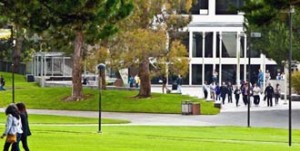RACHAEL MYROW: I imagine being a campus president is a difficult job. But how much of $325,000 is a matter of proper market remuneration and how much is simply keeping up with the Joneses?
JAMIE FERRARE: States over the last decade or so have reduced the amount of funds going to states institutions. As a result we’re asking presidents and senior administrators to generate more income, which means fundraising, grants, and other scholarship work that would attract dollars. That means also increasing tuition. As a result I think the pressure on college presidents is such that it has changed the skill sets that we’re looking for. It’s not unlike running a business or a city these days. Many college campuses are larger than many cities in California. You have all the same expectations, you have security issues, you have academic issues, you have students to take care of.
RACHAEL MYROW: Where does the Cal state network rank in terms of how much it pays its presidents?
JAMIE FERRARE: Generally they are on the low side of average. Obviously California State’s system is highly regarded nationally and internationally. And I think over the years they have paid quite well. That said, in the last decade or so they have not improved or at least stayed where the national averages are going.
RACHAEL MYROW: I imagine it’s hard to find people who are the focal point of all that hatred and dissatisfaction that comes around a system that’s in the midst of massive budget cuts.
JAMIE FERRARE: And without any protection. Faculty have tenure. Staff have contracts. But if the board is dissatisfied with presidents’ service, the board can fire them. There is very little job security for presidents. The national tenure of a college president is about eight years. So with the risk has to come some remuneration.
RACHAEL MYROW: Where do you go shopping for this kind of executive talent?
JAMIE FERRARE: Well, California had always been an attraction in itself. I mean the weather, the richness and diversity of the population. The resources they had available. The economic impact that the institutions have on communities. The president at San Francisco State had been at Northern Michigan. It’s a long winter there. Given the downturn in the economy and what’s happening in California, it’s much more difficult. So you begin looking within the California state system. Who there appears to be ready? It means we are grooming people to move into the presidency. The other avenue is to go across the country to like institutions in other states and look for talented people who have had success there.
RACHAEL MYROW: These campuses are so huge, is it fair to compare this job to the job of the CEO of a Fortune 500 company?
JAMIE FERRARE: I have to do that. I interact with the CEO’s of Fortune 500 companies because many of them they sit on the boards of trustees of colleges and universities. They will say to you readily that the expectations of a college president, with excess of a $100 million budget, are easily, easily correlated to a CEO’s position, with a great deal more public scrutiny.
RACHAEL MYROW: Cal State has replaced nine college presidents in just the last year. Why is there so much turnover right now?
JAMIE FERRARE: One reason, for sure, is that so many baby boomers are retiring. Many of those who were born in the 1940s are retiring now at all colleges and universities. No. 2 is the impact of the job right now. For years now it’s been “cut the budget, cut the budget.” That means at some point you have to reduce staff, and those are painful decision. You have to raise tuition and those are painful decisions. Some people are saying, “I just can’t do that anymore. I need to be in a more positive environment.”
